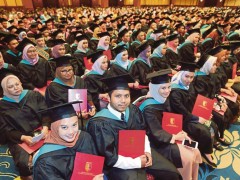Berita

Introduce 'sejahtera' values in education
Tarikh : 01 June 2019
Dilaporkan Oleh : dsh
Kategori : News
Tweet This

‘Sejahtera’ was first mooted in Malaysian public universities to empower the campus community.FILE Pic
By Dzulkifli Abdul Razak
May 31, 2019 @ 11:42pm
MALAYSIA is celebrating the 30th anniversary of the Falsafah Pendidikan Negara 1988 (later revised to Falsafah Pendidikan Kebangsaan — FPK, 1996). It draws from various preceding documents, notably the “Penyata Razak (1956)” that laid out the framework of a truly independent Malaya (later Malaysia).
The FPK clearly promotes the values of “balanced” (seimbang) and “harmonious” (harmonis) as an outcome of education, viz., insan sejahtera. These are emerging concepts that have begun to find their way into the United Nations Educational, Scientific and Cultural Organisation’s (UNESCO) Education for Sustainable Development. It then continues to define what is intended by “balanced” and “harmonious” — namely with respect to four vital dimensions of intellect, physical, emotional and spiritual.
Each plays a vital role in nurturing the values across the national education system, be they in schools, higher education institutions or even the various ministerial organisations nationwide.
This observation alone speaks volumes about the FPK if it is implemented in earnest. Especially in creating policies and activities to enhance the outcome of being “balanced” and “harmonious” as affirmed by the FPK through an indigenous concept of sejahtera in fostering values that are not only locally relevant but beyond its shores.
Sejahtera in the Malay language is not easily rendered into other languages because of its comprehensive and multi-layered meaning and nuances. It underscores that indigenous knowledge and wisdom have had their own context of uniqueness and strength that is relevant to the local community over the years.
Although it is often cursorily translated as “wellbeing” or even “prosperity”, its inherent meaning is much deeper than that.
In fact, it is “beyond prosperity and wellbeing”. It is human-centric in that it spans the macrocosmic-microcosmic nexus. The latter because it relates humans to the external environment — nature, fellow beings, including other species. And microcosmic because it embraces the “self” and the inner (esoteric) dimensions, including spiritual consciousness, and the Creator. Taken together it describes the status of sejahtera as a balanced and harmonious way of life that is underpinned by the promotion and preservation of life, intellect, lineage, wealth and faith as its ultimate outcome.
Together it could be expanded into at least 10 different elements neatly woven in the acronym SPICES, covering the spiritual, physico-psychological, intellectual, cognitive, cultural, ethical, emotional, ecological, economic, and societal dimensions. Not only must each aspect be in a balance in itself, but each must be balanced with respect to the rest to achieve an overall state of sejahtera that lasts (sustainable) over generations.
The last point is pertinent because it implies that values associated with it have existed and are well-acknowledged in many indigenous traditions, but have been lost over a period of time. The result is that leadership in “education” no longer focuses on building values that enhances “collaborative relationships” between humans, the community, the environment and also the “Creator” as an enduring lifestyle. In so doing, the fine state of balance can be severely offset, and the embodiment of sejahtera becomes vulnerable. In other words, education has fallen short of FPK, intentionally or otherwise,
Without doubt, it impacted “relationship” (or co-existence) as one of the values that is vital in making sejahtera work in a balanced and harmonious way with an in-depth meaning, taking the cultural norms in the context and nuances into account. This includes sympathy, empathy, compassion, and the uncompromising spirit of oneness as a part of building relationships based on trust, mutual respect and humility by transcending differences, vengeance and bitterness. All these are vital to narrow the gaps for a closer relationship, co-existence and inter-dependency.
The unprecedented occurrence of violence, aggression as well as other human-made crises cannot be effectively handled without nurturing the values that bind people via the practice of ethical behaviour and relationships. In reality, the world is highly complex, dynamic and interdependent; therefore isolated, compartmentalised, independent and conventional linear approaches are likely to fail.
Instead, constructive values safeguarding and strengthening relationships are essential to allow for self-reliance and steadfastness in mitigating any form of possible crises that are now happening at an ever increasing rate. This means that relationships must be nurtured early on in life as a part of sejahtera that must be cherished, protected and lived by with ample opportunity to do in an academic environment.
Emphasis on one aspect of sejahtera, for example sejahtera ekonomi (the economic aspect), is no longer adequate, because for sejahtera to be balanced and harmonious it must be nurtured in an on-going, holistic and integrated way as spelt out in the very first sentence of FPK 30 years ago.
What is interesting is that the concept of sejahtera was first mooted in a Malaysian higher institution of learning as a way to empower and entice the campus community towards a common set of values in building and safeguarding co-existence. It embraces “education” aligned towards a global agenda by providing a platform that facilitates the embedding of sejahtera firmly in the education ecosystem from a leadership position. It introduces human-centric dimensions of leadership focused on balance and trusteeship, in addition to justice, as a continuum of values-based leadership evolution into the 21st century. This in turn is encapsulated in the overall vision of “humanising education” for insan sejahtera that directly addresses the “anthropocentric” gaps as a major cause of the global crises as an outcome of education without soul.
(This is an excerpt of a presentation at the Values Based Education Global Conference from May 24 to 26.)
The writer, an NST columnist for more than 20 years, is International Islamic University Malaysia rector








